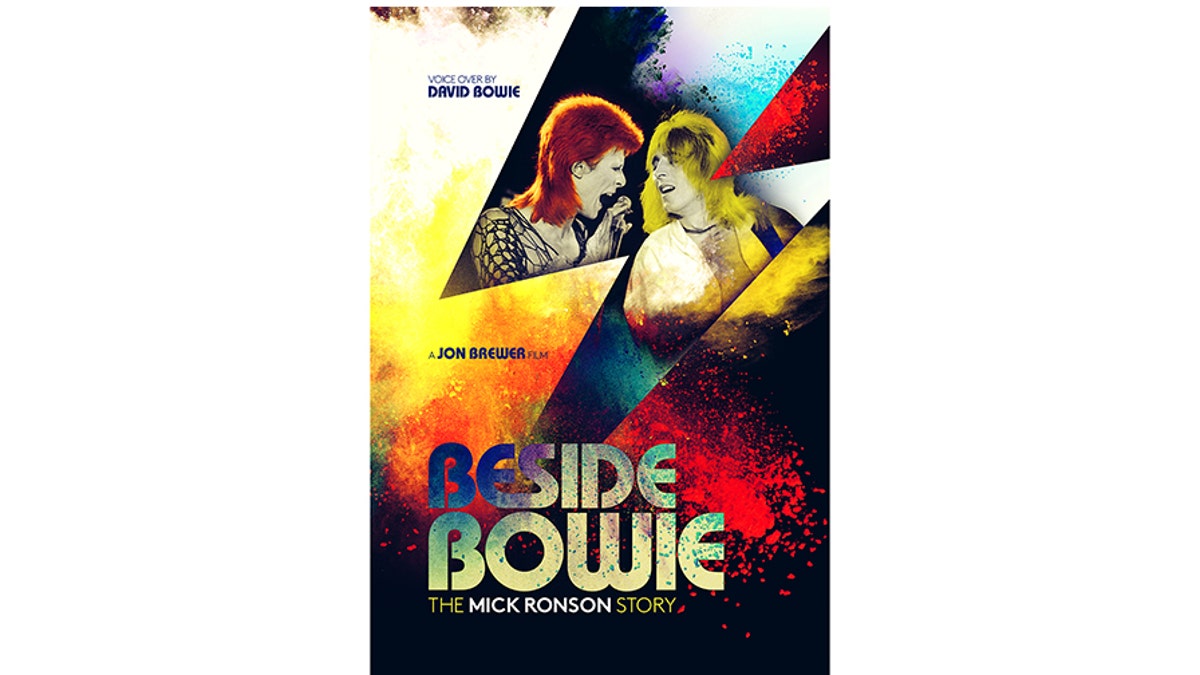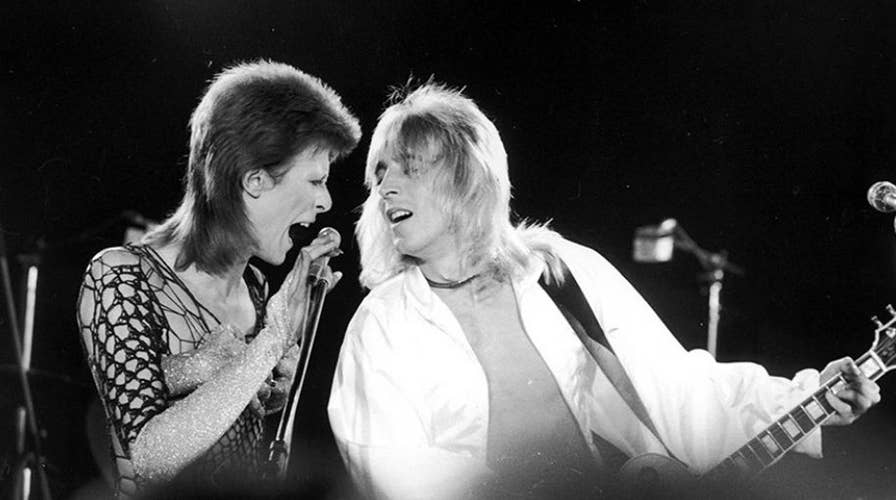David Bowie struggled to tell story of guitarist Mick Ronson
A British filmmaker is hoping a new documentary on the life of late guitarist Mick Ronson will shed light on the artist who helped David Bowie achieve superstardom.
A British filmmaker is hoping a new documentary on the life of late guitarist Mick Ronson will shed light on the seemingly forgotten artist who helped David Bowie achieve superstardom. Ronson died of liver cancer at age 46 in 1993.
Bowie, who would later succumb to the same illness in 2016 at age 69, provided voice-over commentary on the life of his beloved collaborator and sidekick before his passing, which can be heard in Jon Brewer’s film “Beside Bowie.”
DAVID BOWIE'S WIFE IMAN SHARES PHOTOS OF TRIBUTE TATTOOS ON 2-YEAR ANNIVERSARY OF SINGER'S DEATH
Brewer, a close friend of both artists, told Fox News Bowie struggled with the loss of Ronson, whose contributions to music remained uncelebrated despite his work with Morrissey, Lou Reed, Bob Dylan, Mott the Hoople and most notably, Bowie’s band Spiders From Mars.
“David didn’t know what to do,” said Brewer. “He wasn’t able to handle it all… He got further confused on how to acknowledge the gift Mick Ronson had given to David or added to David’s gifts… Unfortunately, David passed before the film was finished.”
The film, which also features interviews with Bowie’s ex-wife Angie Bowie, as well as Queen’s Roger Taylor, Def Leppard’s Joe Elliott, Bowie’s publicist Cherry Vanilla, Mott the Hoople’s Ian Hunter and the late Reed, explores how Ronson, who joined the Spiders From Mars in the late 1960s, would enhance some of the most iconic songs in music history.
Ronson, a classically trained pianist who studied violin as a child, helped transform the songs Bowie wrote on acoustic guitar into theatrical anthems through arrangements and production.
With his first string arrangement, Ronson brought 1971’s “Life on Mars” to life. His contributions as an arranger can also be heard in “Hunky Dory,” “The Rise and Fall of Ziggy Stardust and the Spiders From Mars,” as well as “Aladdin Sane.”
However, as the band was selling out arena shows and rapidly achieving fame, Ronson’s bank account barely grew. Brewer pointed out Ronson didn’t get songwriting or arranging credits on any of Bowie’s early albums.
“Mick was being advised not to worry about it and David was being advised not to worry about it,” Brewer explained. “As far as Mick Ronson was concerned, it was a partnership. Mick would never lift a finger of complaint or [bring an] accusation toward David… [And] David didn’t know how to deal with it because it got worse… David greatly respected Mick Ronson and felt he was the unsung hero.”
Bowie would later shock fans when he abruptly retired his performing alter ego in 1973 at a sold-out concert in London’s Hammersmith Odeon Theatre. Brewer believed Bowie’s frustration in knowing Ronson wasn’t getting rightfully credited for their success, along with his eagerness to explore a different musical direction, contributed to the end of Stardust.
“David didn’t know how to handle the problem that had been created by the industry,” said Brewer. “Mick Ronson co-wrote most of those songs, but as a writer, his managers and publishers told him, ‘Arrangers don’t get publishing credit.’ And David went along with it.
"But he struggled, struggled for years… He wanted to address it, but didn’t know how to do it… [And] when David went on Hammersmith and basically said it’s over… he didn’t mean it was the end of his career. He didn’t want to go on and play as Ziggy Stardust for years and years to come. Ziggy Stardust was a fantastic character, but he wanted to stop that role and move on to other things.”
Ronson attempted to pursue a solo career, but reportedly lived from paycheck to paycheck when that project failed to skyrocket. Brewer said that despite Ronson’s talent, his persona was completely different from that of Bowie’s.
“Mick Ronson was an incredibly simple person who was brought up to have neatly white crisp shirts when he went out and worked as a gardener, but basically in his heart, he was a musician,” said Brewer. “David Bowie I think was probably born to be an entertainer.
"So you have two people who were so different. Both were brought up in completely different areas of the UK. David was always a star and a front man. Mick Ronson was the man who was the engine to the performance in the recording. He was the engine that started it up and pushed it forward.”
Still, Ronson never stopped pursuing his passion for music. Ronson performed and arranged Lou Reed’s 1972 album “Transformer,” including the iconic hit “Walk on the Wild Side.” In 1974 he joined Mott the Hoople and later toured with Dylan’s Rolling Thunder Revue. He also arranged John Mellencamp’s 1982 hit “Jack & Diane.” In 1992, he produced Morrissey’s “Your Arsenal.”
But Ronson never forgot about his friend. Brewer said Ronson and Bowie collaborated from 1990 to 1991.
“Mick spoke to David all the time to basically find a way that they could work together,” added Brewer. “David spoke much more than we even know to Mick… And just when they got back together, Mick passed away.”
Ronson’s last solo album, “Heaven and Hull,” which was released in 1994, would also unite the two artists before his death.
Brewer insisted that even after Ronson was diagnosed with cancer, he kept on working.
“Mick said, ‘I have cancer, and it can’t be cured,’” said Brewer. “Mick would go through these bouts of radiation and therapy and he just gave up. He said, ‘This will kill me quicker than anything.’ [But] he carried on recording. He recorded the night before he died. Weak as he was. And then he went to bed and didn’t wake up… [But] he never stopped. He just went on… But there just wasn’t enough time.”
Bowie, who was devastated by Ronson’s death, was determined to tell Ronson’s story over the years. Brewer said the documentary started a few years before Bowie’s own passing.

(Courtesy of Jon Brewer)
“When I received the voice-over, I immediately realized he had given the chapters for the documentary,” said Brewer. “David fought for years, struggled for years to find a way to tell this story. That’s why I believe he gave us his words.”
"Beside Bowie: The Mick Ronson Story" is currently available for streaming on Amazon Prime.














































